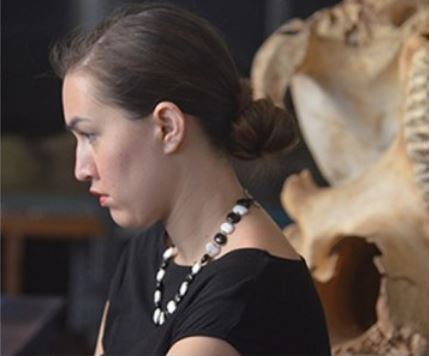
What did you study at Yale, and what is your current profession/job?
I am Associate Curator of Anthropology at the Arizona Museum of Natural History. I received a MPhil in Anthropology from Yale in 2008 and a PhD from Yale in 2011.
What do you like most about your current role? What do you find most challenging and/ or rewarding?
As an Associate Curator at a medium sized museum, I am fortunate enough to wear many hats. I love that every day brings something different. My main role is directing programs at our satellite site Mesa Grande Cultural Park, a Hohokam temple mound, and I really enjoy the creativity of planning educational programming and the interaction I have with the public. I am also involved in exhibit planning and, as with our programs, I really enjoy the challenge of making science applicable and understandable for an audience of all ages, backgrounds, and education levels. It is so rewarding to watch people grasp a difficult concept, like stratigraphy or evolution, because you prepared an example or curriculum that is easy to understand at every level.
How did your time at Yale shape your career trajectory?
I had always wanted a career in museums rather than in academia but was aware that positions were very limited and coveted, even more so than in universities! One of the reasons I chose Yale for graduate school was to work with the late Andrew Hill. He designed the human evolution exhibit at the Yale Peabody, had worked for many years at the National Museums of Kenya and had advised former graduate student Monique Scott in her museum career. I knew he would be an exceptional mentor.
What are the main skills that you acquired as a PhD student which help make you successful in your current career?
Multi-tasking and time management should be part of every student’s skill set but that is not always the case and I found both skills made a huge difference in terms of who was successful and who was not. The Yale curriculum for graduate students in Anthropology is pretty loose in that we had so much freedom to choose our courses and our thesis topics and Dr. Hill was as hands on or off as you wanted in his advising. I felt like I really had to know myself, strengths and weaknesses, to get through the program and that process of figuring out how to maximize yourself with your work and keep yourself balanced has really served me well in my career. I learned to set goals for myself and break tasks up into smaller pieces with shorter deadlines instead of just aiming for the larger results. That practice makes every goal manageable for me.
Did you acquire any professional experience related to your line of work while in graduate school?
Throughout my undergraduate career at Arizona State University I had volunteered and interned with local museums. A lot of graduate students give up hobbies or anything they view as recreational, erroneously believing that anything taking away time from your studying or writing is worthless, but I continued my volunteer activities. Not only was my volunteer work at the Yale Peabody good for my career (I made some wonderful connections and friends there) but it was good for my mental health to continue an activity that I truly enjoyed. I also had a lot of thesis work that was heavily museum collection based and was able to spend a good amount of time working in the National Museums of Kenya and visiting a few other museums. That provided me with hands on experience in dealing with collections issues and interacting with many museum departments.
What advice would you offer PhDs who are interested in your line of work?
Spend as much time as you can in museums and do not limit yourself to just research in collections. As a curator you should understand museums at every level and from every department. Help develop an exhibit, volunteer on the ground at a program, interact with the museum public and get involved in museum education. And be the public yourself – go to as many museums in your area of interest as possible. You should always be up to date on trends in exhibits and education as well as what is going on with collection management. Most importantly make sure you volunteer because museums rely on their volunteers and you should have experience with what your volunteers will want and need to keep the museum successful.
